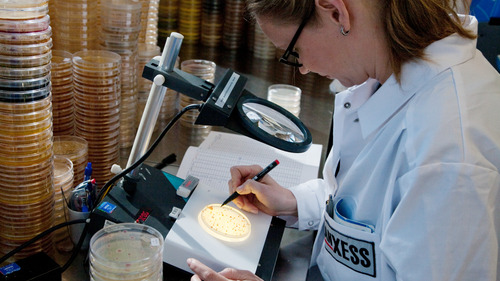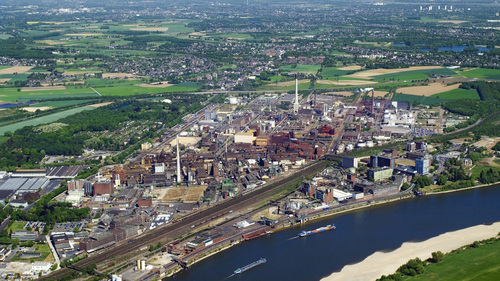LANXESS expands capacity of microbial active ingredient Preventol CMK by 50 percent at Krefeld-Uerdingen, Germany
LANXESS is expanding its production capacity for the active ingredient Preventol CMK (chlorocresol) at the Krefeld-Uerdingen, Germany, site by around 50 percent in response to the continuing strong demand for disinfectants and industrial preservation. The specialty chemicals company has invested a single-digit million euro amount for the expansion, which will be completed still in the first quarter of 2022.
LANXESS markets Preventol CMK as a registered active ingredient for disinfection and preservation and also uses it in its own formulations marketed under the known Preventol and Virkon brands. A rapidly growing area of application is disinfectants in the animal and human sectors. Demand for these products has risen significantly in recent years due to the African swine fever, the avian influenza and the Corona pandemic, among other things.
“With the additional capacities, we remain a reliable partner for our customers and can continue to meet the increased demand for Preventol CMK in the disinfection industry,” said Matthias Arnold, head of the Actives & Disinfection business line at LANXESS’ Material Protection Products business unit. “For disinfectants, we expect sustained high demand even after the Corona pandemic due to an increased hygiene awareness.”
In agricultural businesses, disinfectants based on Preventol CMK help contain the spread of diseases and contribute to the reduction of antibiotics in animal husbandry. The topic of biosecurity is also gaining in importance worldwide due to increasing population and meat consumption, leading to a sustained increase in demand for disinfectants. In the field of human health, disinfectants based on Preventol CMK can be used in hospitals, for example, but also in the household application segment.
LANXESS is the world’s largest producer of chlorocresol and provides regulatory support for the active ingredient in all major biocide markets, such as in Europe under the Biocidal Products Regulation BPR or in the USA with the Environmental Protection Agency EPA.
Increasing requirements in industrial preservation
LANXESS also expects strong market growth in the field of industrial preservation. The CMK-based Preventol products from LANXESS have a very broad and balanced spectrum of activity against molds, bacteria and yeasts - even in highly microbiologically contaminated media. This makes them interesting for numerous applications - especially in leather preservation and construction.
“Our Preventol CMK-based products meet the stringent regulatory requirements worldwide. The expansion will enable us to satisfy the strong demand for these products also in the future,” said Oliver Kretschik, head of the Biocides business line at the Material Protection Products business unit.
In the construction industry, CMK-based Preventol products can replace products containing formaldehyde. In the leather industry, they meet both high technical requirements and rising industry standards in terms of sustainability and toxicity.
Latest news
Hycamite’s technology to decarbonize shipping awarded AiP by industry leader DNV
Kokkola Industrial Park →Hycamite’s proprietary Thermo-Catalytic Decomposition (TCD) technology offers a new approach to producing clean hydrogen by breaking down methane, the primary component of liquefied natural gas (LN...
Clariant catalysts will power the Ecoplanta: Europe's first waste-to-methanol plant
Chemmed Cluster Tarragona →Repsol is building Europe’s first plant to produce renewable methanol from urban waste The facility will use Enerkem gasification technology to produce 240 KTA of methanol Clariant will supply cata...
Lilly plans to build a new $3 billion facility to boost oral medicine manufacturing capacity in Europe for patients worldwide
Netherlands site will bring 500 manufacturing and 1,500 construction jobs while further strengthening Lilly's global supply chain
Ports of Duisburg and Rotterdam advance energy transition together
Port of Rotterdam →With this LoI, the two major European logistics hubs reinforce their goal of jointly developing sustainable transport corridors via waterways as well as future-oriented initiatives for the energy t...


